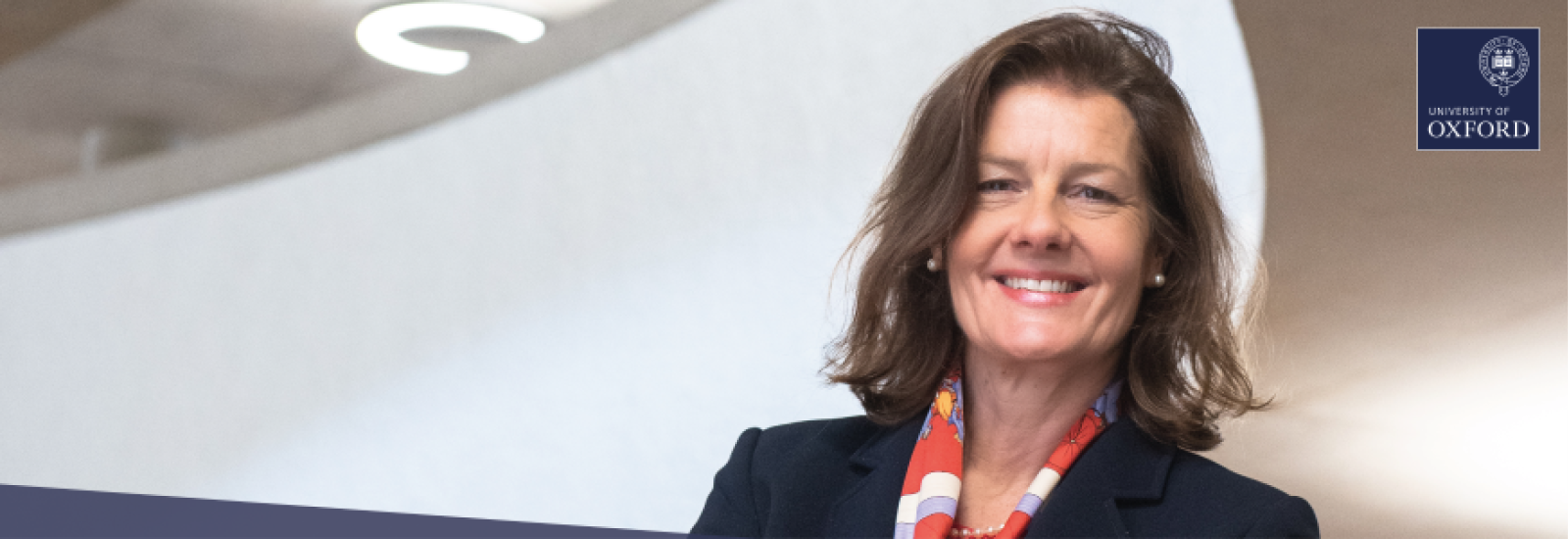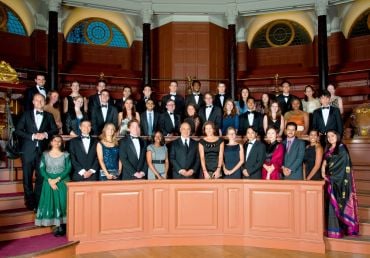
My mother always said I overdid things: anything seems possible with Ngaire Woods, Dean of the Blavatnik School
It seems highly unlikely the words ‘I can’t do it’, have ever crossed the lips of Professor Ngaire Woods. An hour spent in the company of the Dean of Oxford’s Blavatnik School of Government is enough to know. She is just so energetic, so accomplished and so…nice, you can’t be anything other than be very pleased – if a little tired. She does not seem to have heard about resting on laurels. And, if she has, she does not seem to do resting of any kind.
With the Blavatnik School poised to celebrate its 10th anniversary, Professor Woods is looking ahead to its next 10, 20 or even 100 years. This is Oxford, after all, where history is measured in centuries rather than decades, although she admits she [probably] will not still be leading the school in 2122. But who knows – anything seems possible in her company.
It would be quite wrong, though, to assume she has been working to a traditional game plan – with her sights so long set on becoming the Dean of an influential institution that she set one up. It was actually the idea of the then Vice Chancellor, fellow New Zealander, Sir John Hood, (about whom more later). And her story seems to be more about aims than ambitions. Professor Woods confesses her aim, with the Blavatnik School has been simple, (but ambitious), ‘To improve government…. to educate the next generation of leaders to be effective, to do research which helps governments do better.’
Professor Woods' aim, with the Blavatnik School has been simple, (but ambitious), ‘To improve government…. to educate the next generation of leaders to be effective, to do research which helps governments do better
Her career has certainly been on an upward trajectory since she got her first paying job, age 12. The fourth of five children, brought up by her mother, she excelled at school – and ended up with four degrees. Her university career started in Auckland, where she took Economics and Law, worked in a restaurant five nights a week, volunteered on a helpline for women in abusive relationships, debated for the university, and was elected president of the law students. She laughs, ‘My mother always said I overdid things, right from when I was a little girl. I just love doing a lot of different things…I also played field hockey and squash.’
She casually mentions learning several languages too. She speaks French and Italian, and protests that she has forgotten all the Russian and German she learned. Her sisters and brother remained in the antipodes but she, aged 24, came to Oxford, having won a Rhodes scholarship. It was transformative, she admits, recalling with evident fondness her post-grad days at Balliol, ‘It was a magical world of ideas. People were passionate about ideas. They were knowledgeable and erudite and witty.’
Professor Woods emphasises the importance of being challenged and exposed to a broad range of ideas and thinking, she adds, ‘In Oxford, if you argued from a Marxist point of view in a tutorial one week, you would be expected to come from a Hayek angle the next. It was the quality of your argument and the evidence you used that were important.’
Professor Woods emphasises the importance of being challenged and exposed to a broad range of ideas and thinking [when she came to Oxford]...'It was the quality of your argument and the evidence you used that were important
Nothing has changed. But rather than being overwhelmed, she says, ‘It was thrilling…I would sit up until 2am listening to arguments about philosophy…everyone was teaching me so much.’
Professor Woods adds, ‘Coming to Oxford was amazing. Somebody was paying me to study. I had the luxury of being absorbed. It was marvellous and I felt incredibly lucky.’
It was only supposed to be an interlude, before returning to New Zealand. But it did not quite work out like that. More than three decades on, she is still here. After completing a Master of International Relations, Professor Woods commenced doctoral studies – and, at the same time, she was offered a Junior Research Fellowship – a first step on the academic ladder.
‘It was extremely lucky,’ she says. ‘It meant I could afford to do the doctorate.’
Having completed her DPhil, she was offered a fellowship at University College, and within a few weeks was offered a job at Harvard.
‘I was extremely lucky,’ she says…again. ‘I went to Harvard for the Fall Semester and loved it. I loved Harvard and the US system. I built relationships with brilliant Harvard academics, which have motivated me ever since.’
Professor Woods does not really seem to do spare time and manages to fit a lot in as a result...She took PPE undergraduates for politics, Masters’ students for international relations. And, since there are 24 hours in the day, she took up the offer to become a presenter of Analysis on BBC Radio 4
Professor Woods does not really seem to do spare time and manages to fit a lot in as a result. On returning to Oxford, to take up the Univ fellowship, the young academic threw herself into college life. She took PPE undergraduates for politics, Masters’ students for international relations. And, since there are 24 hours in the day, she took up the offer to become a presenter of Analysis on BBC Radio 4, which she did for several years, covering a range of topics such as Russia’s economic reforms after the break-up of the Soviet Union. According to the programme makers, ‘The purpose of Analysis was "to go beyond the bien pensant agenda".’
 Oxford's Blavatnik School of Government
Photo: Hutton + Crow
Oxford's Blavatnik School of Government
Photo: Hutton + Crow‘I started working on issues…Policymakers really need help,’ she says. With a Harvard colleague, Professor Bob Keohane, who had moved to Princeton, she set up Global Leaders Fellowships, which would see candidates spend time in Oxford and Princeton, and put through their paces in terms of practical government and policymaking. At the same time, she was Dean of Graduates at Univ.
It was at this point, Sir John Hood suggested she might think about founding a school of public policy at Oxford. Several famed schools of government already existed – notably the Harvard Kennedy School and the Princeton School of Public and International Affairs in the US. And, in France, there was ENA – the École nationale d'administration, founded by DeGaulle, and renowned for being the institution attended by most modern French leaders. It has since been closed, by President Macron, one of its former students, and replaced by a brand new school, L'Institut national du service public (INSP). Professor Woods sits on the board.
But a decade ago, there was nothing like it at Oxford – and who better than Professor Woods, with her background in international relations and policymaker education, to get it off the ground? Was she inspired by the Kennedy school when in Harvard? No, she says simply, ‘It was John Hood’s idea.’
Before the Blavatnik School was launched, she spent time at each of the leading government schools around the world. The idea was not to replicate what they were doing, she says, but not to make the same mistakes.
‘We wanted to make original mistakes,' Professor Woods laughs.
But, she adds, she did spend time at each of the leading government schools around the world – and with every former Dean of the Harvard Kennedy School. The idea was not to replicate what they were doing, she says, but not to make the same mistakes. Professor Woods laughs, ‘We wanted to make original mistakes.’
One of those former Deans warned her the first five years would be critical – it would shape everything. It was advice she very much took to heart in devising a strategy. So, Professor Woods says, when she first wrote the strategy, she wanted the school to be welcoming, mission-driven, aimed at improving government and for everyone to be part of that mission.
Then, she focused on creating a ‘Fantasy Football’ team of academics, who she would like to attract. Her mentor was highly amused. The team she had assembled on paper was great but, he said, would not be a team and would not achieve her aims. Culture was very key to the school becoming a success and she needed team players, who were dedicated to making it work. It has been a guiding principle for the Blavatnik School and, although she admits there have been mistakes in the 10 years, she says, ‘I have amazing colleagues at the school.’
 Master of Public Policy, Blavatnik School class of 2012.
Master of Public Policy, Blavatnik School class of 2012.From its beginning, the Blavatnik School could fill each year just with applicants from the US, and great pains have been taken with admissions to ensure candidates will benefit from the course – and benefit the school by their presence. They need the intellectual curiosity and ability to make the most of Oxford. They need to be committed to serving others, and other students must be able to learn from them. It has resulted in a very diverse and dynamic community – and a plethora of impressive ambassadors for the school, including politicians, policymakers and influential individuals. One of their own is a Ukrainian MP, who came in when President Zelensky was elected. Others are leaders of charities and civil servants.
Professor Woods is proud that more than 80% of students are on scholarships. A big part of her work now is fund raising and developing funding partnerships. But she is passionate about the key mission of the school: improving government. And the school provides targeted courses for groups of senior leaders sponsored by countries, in addition to the MPP students.
‘We don’t tell people what they should be doing,’ insists Professor Woods. ‘We rigorously research what has worked and use case studies to improve judgment and decision-making…The results have been astounding.’
She adds, ‘There’s been no short cut. We did set the right course in the early years…we’re absolutely going in the right direction.’
Is her mission complete? ‘We can see the tops of the mountains, but we’re in the very very good foothills.’
It seems the energetic academic has finally found a role that occupies her. Well, almost. A glance at her latest blogs, shows she still finds time for commentary and advisory work. So, with politics and government under pressure around the world, does she think now is the time for a school of high-quality government?
Professor Woods laughs again, ‘In my whole lifetime, people have lined up to say how bad government is – from Thatcher and Reagan, to the Cold War, to the Global Financial crisis…my view is simple, most people depend on government working. Even if we make a small improvement, it could make a big difference to them.
In my whole lifetime, people have lined up to say how bad government is – from Thatcher and Reagan, to the Cold War, to the Global Financial crisis…Even if we make a small improvement, it could make a big difference to them
Professor Woods
‘No time, no matter how bad things have been, would some better government not have made a difference.’
In the next five years, she says, she plans to build further relationships with governments, ‘We’re not preaching to them…it’s about problem solving.’
And it is about spreading the mission of good government. These are big aims, although, she smiles, her mother still regrets she did not become a doctor.
But what about the next 10 years, will the Blavatnik School count a prime minister or president among its alumni?
An emphatic ‘yes,’ says Professor Woods, who is not given to making rash forecasts.
By Sarah Whitebloom